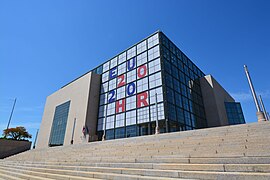
The European Council is a collegiate body that defines the overall political direction and priorities of the European Union. The European Council is part of the executive of the European Union (EU), beside the European Commission. It is composed of the heads of state or government of the EU member states, the President of the European Council, and the President of the European Commission. The High Representative of the Union for Foreign Affairs and Security Policy also takes part in its meetings.
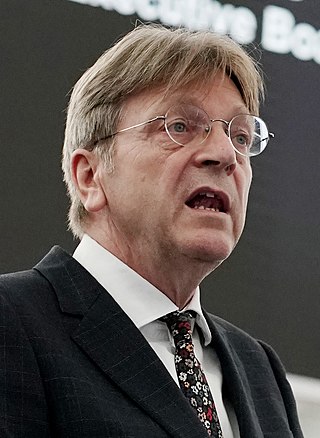
Guy Maurice Marie Louise Verhofstadt is a Belgian liberal politician and an advocate of a Federal Europe. He is a former prime minister of Belgium. He has been a member of the European Parliament (MEP) from Belgium since 2009.
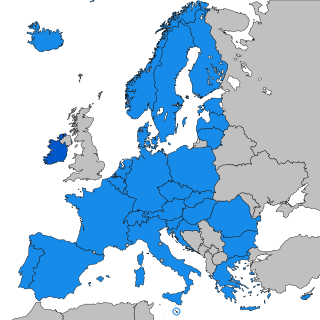
The Schengen Information System (SIS) is a governmental database maintained by the European Commission. The SIS is used by 31 European countries to find information about individuals and entities for the purposes of national security, border control and law enforcement since 2001. A second technical version of this system, SIS II, went live on 9 April 2013. An upgraded Schengen Information System entered into operation on 7 March 2023.
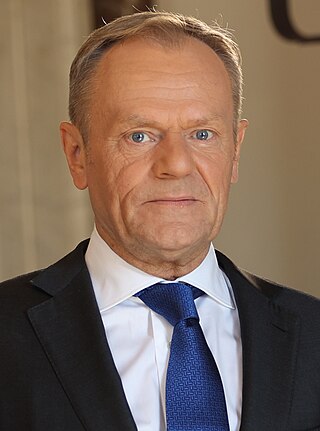
Donald Franciszek Tusk is a Polish politician who has served as leader of the Civic Platform party (PO) since 2021. He was a co-founder of the party and its leader from 2003 to 2014. He served as the Prime Minister of Poland from 2007 to 2014 and president of the European Council from 2014 to 2019. Tusk was also the president of the European People's Party (EPP) from 2019 to 2022.
Pan-European liberalism has been a political force since the establishment of the European Liberal Democrat and Reform Party in 1976.

The European Union (EU) is a political and economic union of 27 member states that are party to the EU's founding treaties, and thereby subject to the privileges and obligations of membership. They have agreed by the treaties to share their own sovereignty through the institutions of the European Union in certain aspects of government. State governments must agree unanimously in the Council for the union to adopt some policies; for others, collective decisions are made by qualified majority voting. These obligations and sharing of sovereignty within the EU make it unique among international organisations, as it has established its own legal order which by the provisions of the founding treaties is both legally binding and supreme on all the member states. A founding principle of the union is subsidiarity, meaning that decisions are taken collectively if and only if they cannot realistically be taken individually.

Miroslav Lajčák is a Slovak politician and diplomat, former Minister of Foreign Affairs of the Slovak Republic. In addition, Lajčák also served as President of the United Nations General Assembly for the 72nd session from 2017 until 2018.

The Schengen Area is an area comprising 27 European countries that have officially abolished passports and many other types of border control at their mutual borders. Being an element within the wider area of freedom, security and justice policy of the European Union (EU), it mostly functions as a single jurisdiction under a common visa policy for international travel purposes. The area is named after the 1985 Schengen Agreement and the 1990 Schengen Convention, both signed in Schengen, Luxembourg.

The largest expansion of the European Union (EU), in terms of number of states and population, took place on 1 May 2004.

Nordic-Baltic Eight (NB8) is a regional co-operation format that includes Denmark, Estonia, Finland, Iceland, Latvia, Lithuania, Norway, and Sweden. Under NB8, regular meetings are held of the Baltic and Nordic countries' Prime Ministers, Speakers of Parliaments, Foreign Ministers, branch ministers, Secretaries of State and political directors of Foreign Ministries, as well as expert consultations where regional issues and current international topics are reviewed.

George Ciamba was a Romanian diplomat who served, from November 2018 to November 2019, as the Romanian Minister for European Affairs, including during Romania's 2019 first presidency of the Council of the European Union.
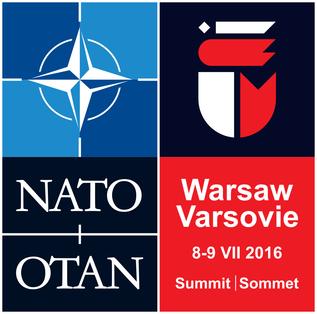
The 2016 Warsaw Summit of the North Atlantic Treaty Organization (NATO) was the 27th formal meeting of the heads of state and heads of government of the North Atlantic Treaty Organization, held at the National Stadium in Warsaw, Poland, on 8 and 9 July 2016.
International reactions to the United Kingdom European Union membership referendum of 2016 are the reactions to the decision to leave the European Union by the United Kingdom. The main reaction was on global financial markets experiencing extreme volatility.
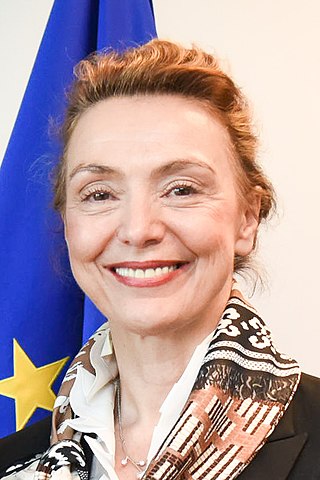
Marija Pejčinović Burić is a Croatian politician of the centre-right Croatian Democratic Union party who served as Minister of Foreign and European Affairs and First Deputy Prime Minister of Croatia from 2017 to 2019. She was the third woman to hold the post of foreign minister, following Kolinda Grabar-Kitarović and Vesna Pusić. Pejčinović Burić previously served as a Member of Parliament during its Sixth Assembly (2008–2011), representing the 6th electoral district.

Czech Presidency of the Council of the European Union occurred in the first half of 2009. On 1 January 2009, Czech Prime Minister Mirek Topolánek became the President of the Council of the European Union. When Topolánek's cabinet lost a vote of no-confidence, he was replaced by Jan Fischer on 8 May 2009. Presidency went over to Sweden on 1 July 2009.

Victor Negrescu is a Romanian politician of the Social Democratic Party. He is a Member of European Parliament and he was Minister Delegate for European Affairs in the government of Romania between 2017 and 2018. Since 2007, he is the president and national coordinator of the Romanian network of PES activists.

The von der Leyen Commission is the current European Commission, in office since 1 December 2019 and is to last until the 2024 elections. It has Ursula von der Leyen as its president and it further consists of one commissioner from each of the member states of the European Union.

The COVID-19 pandemic and its spread in Europe has had significant effects on some major EU members countries and on European Union institutions, especially in the areas of finance, civil liberties, and relations between member states.

The COVID-19 pandemic has affected international relations and caused diplomatic tensions, as well as resulted in a United Nations Security Council resolution demanding a global ceasefire.

The Frugal Four is the nickname of an informal cooperation among like-minded fiscally conservative European countries, including Austria, Denmark, the Netherlands and Sweden. It partly evolved as a successor of the New Hanseatic League that was set up to make up for the loss of the like-minded United Kingdom in the European political arena after Brexit. However, it was never founded as a transnational organisation like similar cooperations of countries in the European Union with shared interests.


